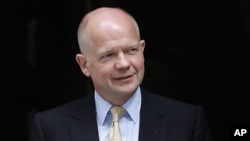Britain’s foreign secretary announced a major shake-up of the country’s Foreign Service on Wednesday. William Hague told politicians that greater ties will be built across Asia and Latin America - a reflection, he said, of a changing balance of power in the world.
Speaking to British politicians in parliament on Wednesday, Hague outlined the changes.
“We will significantly increase our presence in India and China, the world's two emerging superpowers," said Hague.
He said 50 diplomats will be deployed to China and 30 to India.
Britain will also be sending new ambassadors to Kyrgyzstan and South Sudan and reopening its posts in Madagascar and El Salvador. When security permits, an embassy is also set to open in Somalia.
Hague said diplomats will help build business relations.
“There is not and will never be any substitute for a strong British diplomatic service that advances the interest of the United Kingdom," he said. "We can never rely on anyone else to do that.”
Mark Wickham-Jones is an expert in politics at Britain’s University of Bristol.
He says the move is part of an overall shift in Britain away from its ties to Europe. The new focus, he says, is primarily economic.
"Historically, British diplomacy has been very oriented towards Europe, certainly in the last 30 years with the decline of the Commonwealth," said Wickham-Jones. "I think this reflects a shift towards new markets and a shift away from the cultural and towards the economic."
Wickham-Jones says diplomats can be a useful tool for building business relations in emerging markets. But, he says, only time will tell whether the shift will bring home the money.
"We all know about the dramatic rates of growth in China," he said. "We all know about the emerging middle class in India, and you could see a role for diplomats in sort of fostering links for those countries, facilitating business. But you're not going to see any dividends immediately."
Foreign Secretary Hague said Britain will maintain its links to Brussels, Geneva and the U.S.
But he said the foreign office has to plan ahead and build the right relations for the future.
Christian Schweiger is an international relations expert at Britain’s Durham University.
He says Britain is not the only country working to build new foreign relations.
"If you look at the areas where it opens, I mean it's South America, it is the former Soviet Union," said Schweiger. "Then you have the Mediterranean, Africa and the Middle East. These are obviously areas where all countries and all global powers, if you look at China or America, have interests."
And he says new ties would not be good news just for Britain. He says the countries that are to receive more British diplomats and new embassies will likely view the move as a boon to their own status.
"They will say, Britain is taking us more seriously, Britain wants a presence here," he said. "So from their perspective, it will be definitely welcome. The question is, will this be accompanied by any other measures. For example, any direct development aid, any sort of financial, economic, infrastructural support - that remains to be seen."
Schweiger says it is notable that Britain is setting out to build new diplomatic ties on its own rather than as part of the wider European Union. He says it is a further step in an ongoing move by Britain’s current government to distance itself from Europe.




